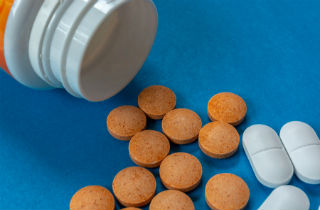Author of Alive Again: Recovering from Alcoholism and Drug Addiction
Meet the New Boss, Same as the Old Boss
My wife is a huge fan of the television show Grey’s Anatomy. Our home DVR is filled to the gills with stories where doctors at a fictional hospital struggle to balance their personal and private lives with the life-or-death struggles of their patients, all while learning — on a daily basis — that Sometimes People Perish. This, to my sensibilities, always begs the question that every medical student is supposedly asked when coming up in the field: How much trauma can the patient withstand?
And, if word on the street is correct, the answer is always, inevitably, the same: How badly does the patient want to survive? So what’s the role of substitution therapies like methadone and buprenorphine for today’s addicts?
Methadone for dope sickness?
As a recovering heroin addict, whenever I was dope-sick in New York, I would always take to the streets and buy methadone – a liquid substitute for heroin (and other opiates) that was often used to regulate and retard withdrawal. And, I would buy it from other heroin addicts who, for reasons of their own, needed the money to go and buy real drugs.
Now, I was fortunate in that, eventually, I checked into a treatment center that demanded I stop using drugs altogether. My own detox experience was horrible, but I managed to walk through it because I had the strength and support of my counselor and my peers and the doctors who helped manage my withdrawal symptoms as they arose. This was not the case for Oren Pius, the Admissions Director at my treatment center who (today) has almost 10 years clean and sober, but, before which, was a slave to methadone for over a decade.
You see, methadone can be addictive
Classified as a Schedule II Narcotic by the FDA, methadone is usually only available from hospitals or methadone clinics; addicts are required to show up at these places every day to receive their daily doses in an attempt to stave off or thwart withdrawal. Methadone clinics are everywhere because they seemed a great idea at the time. The philosophy was, “Let’s give the addicts methadone to keep them from committing crimes to get their drugs”, which made total sense. Harm Reduction has always been the government’s fallback position in the war on drugs, but for addicts like Oren (who had become so dependent on methadone that he couldn’t leave the city for fear of missing a dose) methadone became the bars of his new prison.
Methadone is more addictive than heroin
Now, if you ask any junkie on the street, they will tell you that methadone is much more addictive than heroin, if only because a methadone detox is one of the hardest detoxes there is.
What about buprenorphine?
Which brings us hurtling into the 21st century and the new wonder drugs that have saturated the market: Subutex and Suboxone (active ingredient buprenorphine). These have been classified as Schedule III Narcotics, which means (simply put) that, instead of having to go to specialized clinics to procure their doses of this drug, addicts can now walk into any neighborhood pharmacy and get their fix. Subutex and Suboxone are behind the pharmacist’s counter sharing shelf-space with allergy medications and antibiotics.
Do Suboxone and Subutex work?
Suboxone (burprenorphine hydrochloride mixed with naloxone hydrochloride) and Subutex (buprenorphine hydrochloride) are drugs that are designed as a “tag team” approach to opiate withdrawal. Subutex is usually administered at the front end when treating opiate dependency. The patient will use the drug for the first three or four days at the onset of withdrawal to manage their symptoms and keep their cravings at bay. The detox is then “handed off” to Suboxone, which has the opiate blocker Naloxone (not to be confused with Naltrexone) in it. What this means is that, if the heroin addict uses heroin, they can’t get high, so they don’t (Oren Pius reports that he used heroin off-and-on the entire time he was using methadone).
The thinking is that, eventually, the addict will come off the Suboxone and lead a full, productive life. But, in my experience, that isn’t always the case. I had a celebrity come through the program at my treatment center recently who claimed to have been using Suboxone for about 18 months and was terrified to come off of it. Symptoms of Suboxone addiction are tricky. There was even an instance where he thought his dose was late, and he became violent, yelling and knocking things off of the walls. He simply could not live or function without it.
And I believe that’s only part of the problem. What we’re finding are doctors and psychiatrists passing themselves off as Addiction Specialists who are now able to prescribe this Schedule III Narcotic to their patients without introducing any kind of Suboxone taper, which is a more manageable detox than the heroin detox.
Addicts on Suboxone don’t feel sober
In my experience, addicts who are still on Suboxone all state that they don’t feel sober and, consequently, never get to feel like a part of the recovery community. These “Normie” doctors (medical professionals who have not overcome addiction themselves) and psychiatrists who are prescribing Suboxone (without factoring in the addict mentality) are actually doing the addict a great disservice, because they are robbing the addict of the opportunity to walk through the fear of the heroin detox and come out of the other side with the self-esteem that usually goes hand-in-hand with such an accomplishment.
Does substitution therapy help or hurt?
What do you think? Should doctors be able to prescribe these medications without a tapering plan? How can we help addicts help themselves? Tips to prevent relapse generally work for those who want to quit drugs. Is using Suboxone or methadone equal to using? Your comments and input are important to us and we hope to hear from you below.









Related Posts